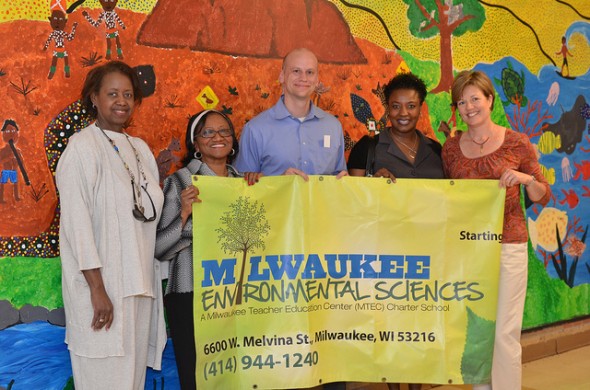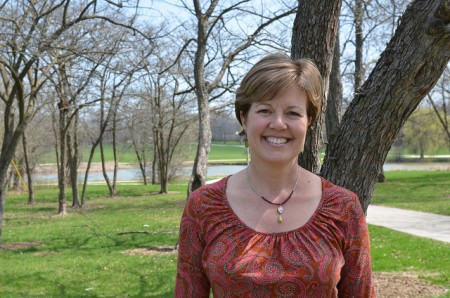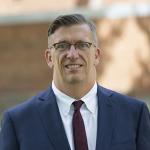New Green Education School to Open
New MPS school, Milwaukee Environmental Sciences, is modeled on programs in more than 150 schools in 31 states.

Sallie Brown, Rhulene Artis, Dave Libert, Alisia Moutry and Kirstin Anglea display the Milwaukee Environmental Sciences banner inside the new school. (Photo by Sue Vliet)
Between now and the first week in August, when Milwaukee Environmental Sciences is expected to open, the new principal and others have a lot of work to do to get the former 65th Street School building ready.
Milwaukee Environmental Sciences will be a year-round Expeditionary Learning school, using hands-on projects to explore topics in depth. More than 150 schools in 31 states and Washington, D.C., use this model.
According to Dave Libert, school planning leader for the Milwaukee Teacher Education Center (MTEC), children will spend several weeks studying topics such as water quality, urban forestry, ecosystems in nearby Dineen Park’s lagoon, or gardening on the school’s planned green roof.
When students study water quality, for example, they could delve into the 1993 outbreak of the cryptosporidium parasite in Milwaukee’s water supply. Lessons might include presentations by Milwaukee Metropolitan Sewerage District personnel and other experts.
“This isn’t like kids playing at answering [real-world] questions; they’re working on them,” said Libert.
This is the fourth attempt to bring Expeditionary Learning to Milwaukee. According to Libert, who was not involved in the earlier efforts, the earlier schools were unsuccessful “due to a lack of rigor.”

New principal Kirstin Anglea is ready to begin the school year this August. (Photo by Sue Vliet)
Milwaukee Environmental Sciences plans to blend academic rigor with student participation to ensure that the school performs at a high level. The school, spearheaded by MTEC, will also offer professional development for teachers in training. Milwaukee Environmental Sciences is MTEC’s first charter school.
The MPS School Board approved MTEC’s proposal for the new charter school in January. MTEC’s lease on the building begins July 1.
According to Kirstin Anglea, the new school principal, the building will need work before students arrive.
“[Over the next few months], my biggest concern is to make sure the building is impeccably clean, the library is ready to be filled with books and be a comfortable space,” she said. “I want to make sure the bathrooms are as environmentally friendly as possible and clean. … For a lot of the rest of the space, we want to work with the kids to make decisions about the school.”
Another big task during the next few months will be to reach out to families to encourage them to enroll their children in the school, according to Anglea. The planning team is holding parent meetings, distributing fliers and door-hangers in the neighborhood surrounding the school, and will host a June 8 picnic for families. Organizers hope that 180 students in grades pre-K through 5 will sign up for the school this year.
Tina Weatherall’s granddaughter will be starting K4 at Milwaukee Environmental Sciences this year, and Weatherall said she is excited to “get in on the ground floor.”
“I had been getting ready to start researching schools for my granddaughter,” said Weatherall. “It was going to be a process. When I went (to the library) for the orientation, I was so impressed; I just knew that this was the school.”
Having worked in childcare for the past 11 years, Weatherall said she knows what to look for in a school. “You see a lot of charter schools opening up nowadays, and, being honest, this is the first charter school that I researched and I was very impressed with. It’s not just someone coming in trying to make a few extra dollars,” she said.
As a “non-instrumentality” charter school, Milwaukee Environmental Sciences will have its own governing board and fewer regulations than MPS schools. However, Anglea emphasized that it will be a public charter school. “We are not just taking the best and the brightest,” she said. “We want a diverse student body.”
According to Anglea, who most recently was a graduate professor in educational leadership at Cardinal Stritch University, hands-on instruction in real-world settings is key to learning.
“Kids have disengaged from school and we can’t afford that,” she said. “Not if we want engaged citizens in the future.”
This story was originally published by Milwaukee Neighborhood News Service, where you can find other stories reporting on fifteen city neighborhoods in Milwaukee.






















Very cool! This stuff ought to be IN ALL schools – not just considered a specialty!